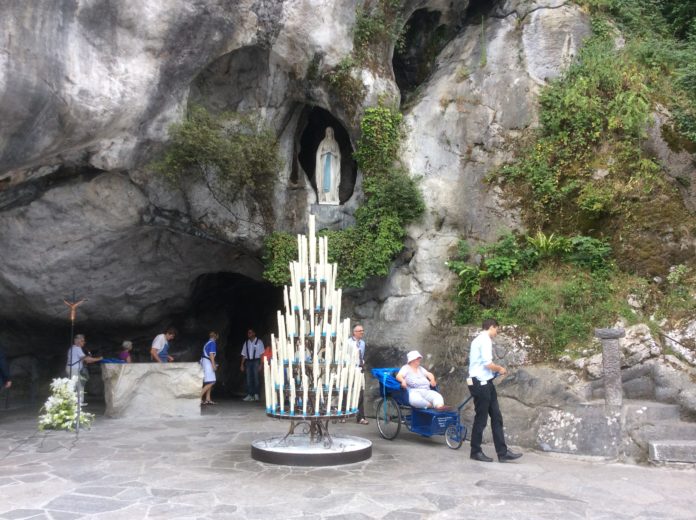CLOGHER DIOCESAN PILGRIMAGE TO LOURDES 2017
HOMILY AT MASS AT THE GROTTO
BY MGR JOSEPH McGUINNESS,
DIOCESAN ADMINISTRATOR OF THE DIOCESE OF CLOGHER
Saturday 8 July 2017
Readings: Romans 8:28-30, John 19:25-27
‘The Gospel tells us… of the invitation of Jesus to us to make a place in our lives for his beloved Mother, for she has service to offer to us, if we let her – of health for the sick; of refuge for sinners; of comfort for the afflicted. As in our prayer we ask for her loving intercession, may we learn more and more that it is not just blessed to give with love, but blessed also to receive with joyful thanks.’ – Mgr McGuinness
The patron saint of our Diocese, St Macartan, is traditionally regarded as a faithful companion of St Patrick and a man of great physical strength. A common image of Macartan is that of him carrying Patrick on his back across fast flowing rivers, as they travelled the country preaching the Gospel. It reminds us vividly of the need for support and care in every human life and particularly the Christian call to serve others in imitation of the example of Christ. It’s an image of devoted service and an appropriate one for us to imagine in the setting of this sanctuary. Here in Lourdes we see around us countless examples of loving service and generous support. The great sense of kindness, compassion and generosity which infuses this place is one of the things which leaves a lasting impression on all who visit here.
We hardly need to be reminded that as Christians we are called to serve others, but it is worth reflecting that service involves two people, the one who serves and the one who is served. We would all like to think that we can readily respond to the needs of others, that we can be good, faithful and generous servants, that we, like Macartan, can be ready to carry others when they needed us.
But what about when we are the ones who are in need? How are we at receiving rather than giving? How do we feel about allowing others to serve us? Indeed, do we always realise that we need to open our hearts and our lives to the gifts and grace that comes from others, and through them, from God? This may seem an odd question to be asking, but the fact is that the gracious acceptance of service is a service in itself, and it’s not something that we’re always good at doing.
There may be all sorts of reasons for this. We may feel that our pride won’t allow us to recognize the real need we have; we may be reluctant to put ourselves in debt to someone else; we may have a fear of dependence on others; we may not wish to be reminded of our own limitations, or we may simply feel unworthy.
But all of these things can be obstacles to grace and the working of grace in our lives. They can prevent us from a joyful acceptance of the mercy and forgiveness of God, the gift of his Son, and his power to touch our lives through the goodness of others.
Which brings me to the scene described in the Gospel we have just heard. In the life of Jesus we find many examples of his willingness to accept graciously the service of other people. We can think of Martha and Mary, of the woman at the well, of Simon of Cyrene…and in our Gospel story today there is a lesson both in service given and service received. While the central and greatest act is the self-giving of Jesus on the cross, in the figures around him, the three Marys and the disciple John, we are presented with an act of service to Jesus himself. Any of us who have spent hours in vigil at the bedside of one who is dying will recognize it. In the figure of Mary, the mother of Jesus, we see the Comforter of the Afflicted who brought comfort to the Son whom she had nourished and nurtured.
While in Lourdes we rightly and deeply appreciate the loving service of doctors, nurses, careers and helpers of assisted pilgrims, we should also recognise the service and gifts which our assisted pilgrims give to us. From them we can learn a gracious acceptance of the limitations which life can impose. From them we can also learn a gracious acceptance of service given in love. There are lessons here for us in humility, in openness of heart and spirit, for it is through the broken cracks in our lives that the Lord enters in, if we let him.
The Gospel tells us too of the invitation of Jesus to us to make a place in our lives for his beloved Mother, for she has service to offer to us, if we let her – of health for the sick; of refuge for sinners; of comfort for the afflicted. As in our prayer we ask for her loving intercession, may we learn more and more that it is not just blessed to give with love, but blessed also to receive with joyful thanks.



